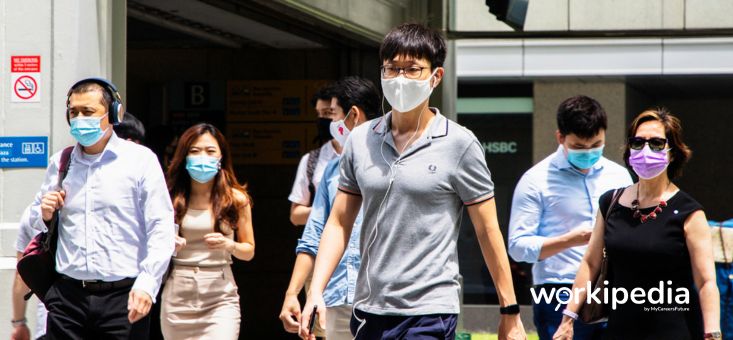All Singaporean employees are allowed to return back to their workplaces from April 26, as part of an overall update on Singapore’s new phase in dealing and living with the Covid-19 pandemic.
In addition, employees can also remove their masks at their workstations.
Co-chair of Singapore’s Covid-19 task force Lawrence Wong, who is also Finance Minister, explained at a press conference: “(It is) very hard to be back at work throughout the day, and work while wearing a mask. Therefore this flexibility is extended.”
However, he urged Singaporean workers to remain vigilant when possible, and maintain a safe distance from their colleagues if they are not wearing a mask.
Minister Wong added: “If you take off your mask when you’re working, ensure that you’re maintaining a safe distance from your colleagues and, obviously, do not gather together in a crowded setting.”
The Health Ministry said that even with these changes, employers are encouraged to retain flexible work arrangements such as telecommuting and staggered work hours.
“Beyond the workplace benefits of flexible work arrangements, this will also help workers avoid peak period crowds as more of us return to the workplace,” it added.
Of course, more questions were raised amid all the excitement, especially after having navigated differing measures and regulations over the past two years. Can you hang out with your colleagues for meals? How many can gather? What are the new Safe Management Measures (SMMs) at the workplace?
We took a deeper dive into what Singaporeans are searching for on Google, and the answers to the questions we’d all like answered below!
So, exactly when and where do we have to keep our masks on and off?
Mask-wearing will continue to be required in indoor settings when people leave their homes, including on public transport.
Workers will also be allowed to remove their masks at their workplaces, so long as they are not interacting physically with others and are not in customer-facing areas.
These requirements are meant for general workplace settings. Specific workplaces like shipyards may have to fulfil additional requirements and could have sector-specific requirements.
My employer says we will need to hotdesk. What does that mean?
Hotdesking is a way of organising the workspace so that desks can be used by different colleagues at different times, on an ad-hoc basis.
During the Covid-19 pandemic, some companies shifted to hotdesking as a way to maximise space efficiency and lower their rental costs, by reducing office space they didn’t need.
Commonly seen at co-working spaces, they have become a staple in private offices. Hotdesking is also linked to an increase in cross-disciplinary collaboration as well, given different teams share the use of the same space.
Hybrid and flexible work arrangements: When and where exactly do I need to work?
In a hybrid work model, employees can work from both the office, as well as offsite locations, such as home, or anywhere else you’re comfortable with (e.g., a café).
With flexible work schedules, you’ll have the flexibility to get work done when you’re more productive. For example, some work best early in the morning, while others do better in the evening.
According to Minister of State for Manpower Gan Siow Huang, in 2020, three in four employees worked in companies that provided some form of remote work arrangement.
The Ministry of Manpower, National Trades Union Congress and the Singapore National Employers Federation have also strongly encouraged employers to continue allowing flexible work arrangements to their workers and promote such arrangements as a permanent feature.
For example, companies may ask staff to return to office for meetings while allowing them to telecommute for tasks that do not require them to be present in the office.
Read More: Hybrid Working — What Challenges to Anticipate and How to Manage
Are we allowed to organise corporate events and social gatherings at the office now? And can my boss call for face-to-face meetings?
There will no longer be a limit on group sizes. This means that people will not need to keep to a group of up to 10 persons for mask-off activities. There will be no need to maintain safe distancing between individuals or groups, though of course, workers are advised to still maintain this if maskless.
Corporate events such as dinner-and-dances can now be organised if all attendees are either fully vaccinated, recovered from Covid-19 in the past 180 days, or medically ineligible for vaccination. However, food and beverages must be served individually and consumed while seated.
So, if we’re allowed to meet for birthday cake in the pantry… obviously the boss can call for face-to-face meetings lah!
My office now has a workpod. What’s that?
Workpods are basically structures created as mini soundproof workspaces and come in different sizes, but usually will include a desk, chair and electrical outlets.
They’re known also as office capsules, phone booths, or acoustic pods. Workpods may sometimes require pre-booking even in your own office, as they can be popular for those needing some privacy with sensitive work calls.
Ultimately, it’s important local workers and companies don’t become complacent, given how new variants can emerge from time to time, and remember there are ongoing Covid-19 waves worldwide.
Stay careful, stay vigilant!
Trade and Industry Minister Gan Kim Yong, who is also a co-chairman of the task force concluded: “We must continue to remain vigilant even as we continue to ease up our measures.
“And in the weeks to come, we can expect that the number of cases may increase because of a greater easing this time round and, therefore, we also have to remain vigilant and continue to monitor the situation and be prepared to adjust our measures from time to time.”















